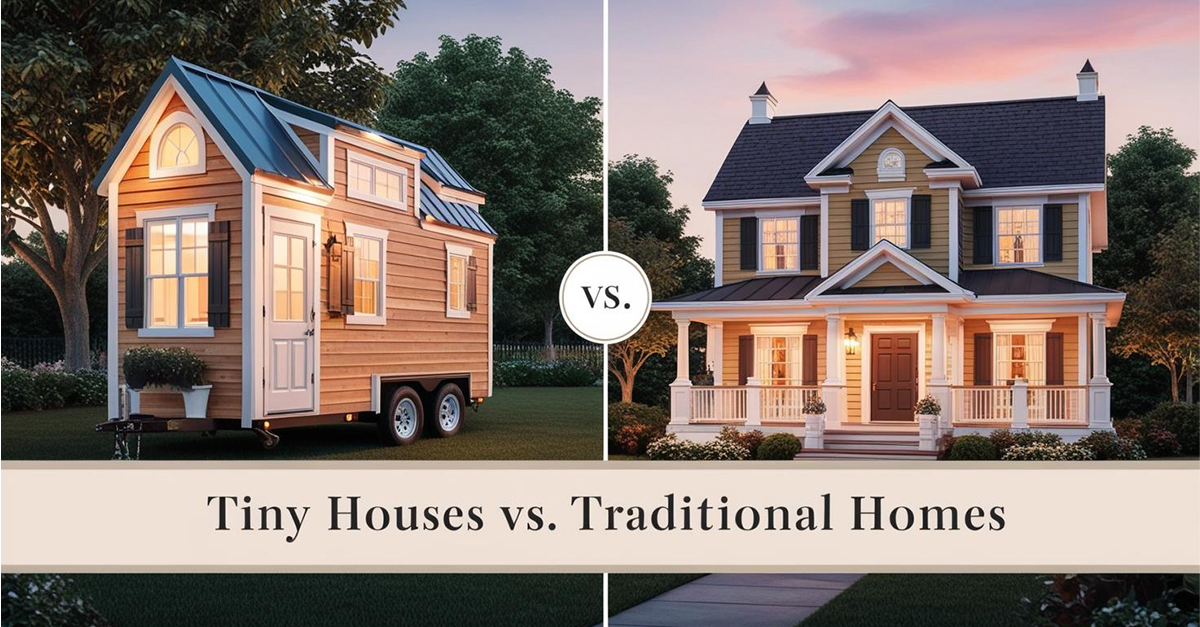News
Tiny Houses vs. Traditional Homes: Which Is Right for You?

The choice between a tiny house and a traditional home is more than a decision about square footage—it’s a lifestyle choice. Both options offer unique advantages and challenges, so how do you decide which is right for you? Let’s break it down by comparing key aspects of tiny houses and traditional homes.
1. Space and Functionality
Tiny Houses:
- Typically under 400 square feet, tiny houses prioritize efficiency and multi-functional design.
- Ideal for those who value simplicity, minimalism, and the challenge of living with fewer possessions.
- Perfect for singles, couples, or small families who don’t need much personal space.
Traditional Homes:
- Offer significantly more space, often ranging from 1,000 to 3,000 square feet or more.
- Provide designated areas for different activities (e.g., bedrooms, living rooms, and offices).
- A better fit for larger families or those who enjoy hosting gatherings.
Which is right for you?
If you thrive in compact, efficient spaces and are comfortable decluttering, a tiny house could be perfect. If you need room to spread out or accommodate others, traditional homes are more suitable.
2. Cost and Affordability
Tiny Houses:
- Lower upfront costs, ranging from $20,000 to $100,000 on average, depending on customization.
- Reduced utility bills and maintenance costs.
- Lower property taxes (or none, if mobile).
Traditional Homes:
- Higher purchase prices, often exceeding $300,000 depending on location.
- Require larger budgets for utilities, maintenance, and property taxes.
- Greater long-term investment potential.
Which is right for you?
If financial freedom and minimal debt appeal to you, a tiny house can offer significant savings. If you’re looking for a long-term investment and can handle the costs, a traditional home may be better.
3. Mobility and Flexibility
Tiny Houses:
- Many tiny homes are built on wheels, allowing you to move with ease.
- Great for adventurous spirits or those who want flexibility in where they live.
- Can be challenging to find legal parking or suitable land.
Traditional Homes:
- Fixed in place, offering stability and a permanent address.
- Easier to integrate into established communities.
Which is right for you?
If you value adventure and mobility, a tiny house on wheels might be your dream. If you prefer stability and building roots, a traditional home is a better choice.
4. Environmental Impact
Tiny Houses:
- Smaller footprint means less energy consumption and fewer resources used during construction.
- Often built with sustainable materials and equipped with eco-friendly features like solar panels and composting toilets.
Traditional Homes:
- Larger homes consume more energy and resources, both in construction and day-to-day living.
- Can still be environmentally friendly with upgrades like energy-efficient appliances and insulation.
Which is right for you?
If sustainability is a top priority, tiny homes are the clear winner. Traditional homes can be eco-friendly but require more effort to achieve the same impact.
5. Lifestyle and Personal Goals
Tiny Houses:
- Promote a minimalist lifestyle, reducing clutter and focusing on essentials.
- Encourage outdoor living and creative use of space.
- May require sacrifices in comfort and privacy, especially for families.
Traditional Homes:
- Provide more comfort, privacy, and space for hobbies, entertaining, or storage.
- Support a variety of lifestyles, from raising a family to working from home.
Which is right for you?
If you’re drawn to simplicity and are ready to embrace a minimalist lifestyle, a tiny house might suit you. If your lifestyle requires more comfort and space, traditional homes offer more flexibility.
6. Legal and Zoning Considerations
Tiny Houses:
- Zoning laws and building codes can be restrictive, making it challenging to find legal places to park or build.
- More accepted in areas with tiny house-friendly communities.
Traditional Homes:
- Fully compliant with zoning regulations and easier to finance with traditional mortgages.
- Greater availability of suitable land and established neighborhoods.
Which is right for you?
If you’re willing to navigate legal hurdles, tiny houses can work. For those seeking a hassle-free option, traditional homes are simpler.
Making Your Decision
The choice between a tiny house and a traditional home boils down to your priorities:
- Do you crave freedom from debt, sustainability, and adventure? A tiny house could be your perfect fit.
- Do you need space, comfort, and stability? A traditional home might be the better option.
Final Thoughts
Both tiny houses and traditional homes have their merits. The right choice depends on your financial situation, lifestyle, and future goals. Take time to evaluate your needs, visit tiny homes or traditional properties, and consider the trade-offs before making your decision.
Are you leaning toward a tiny house or a traditional home? Share your thoughts in the comments below!
